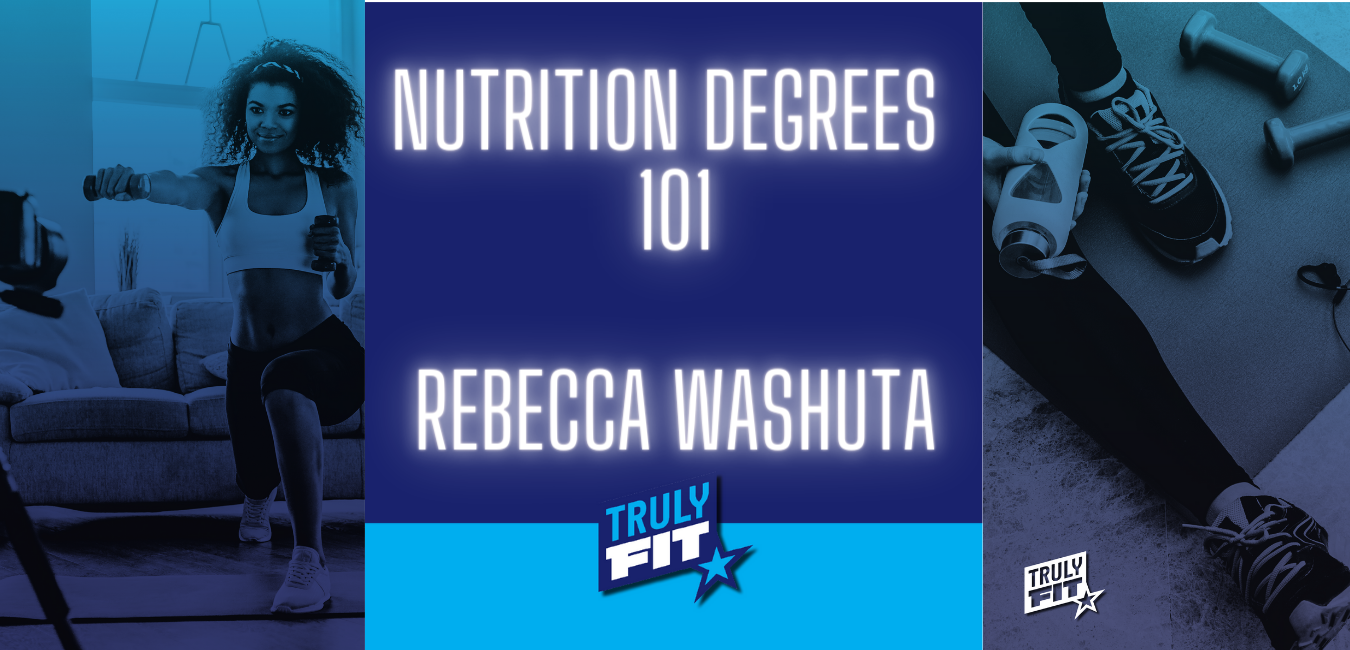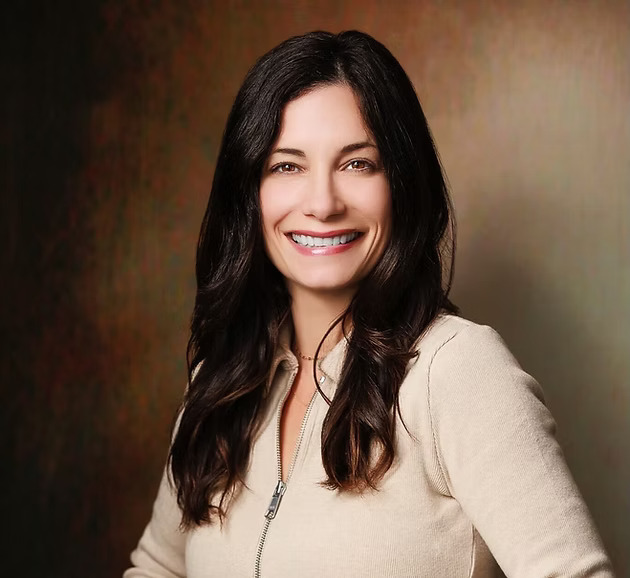
Nutrition Degrees 101 with Rebecca Washuta

Guest: Rebecca Washuta
Podcast Release Date: 2/8/2021
Welcome to Trulyfit the online fitness marketplace connecting pros and clients through unique fitness business software.
Steve Washuta: Welcome to the truly fit podcast, I am your host, Steve Washuta, co-founder of truly fit, and author of Fitness Business 101. On today’s podcast, we are having on Rebecca Washuta, who is my sister and a licensed dietitian or a licensed nutritionist or Registered Dietitian, or a certified nutrition specialist. I don’t really know to be honest with you.
And that’s why we’re having this podcast because I know the general public is in the same position I am, and very confused about all the different nutrition-related certifications and degrees. So we’re gonna have Rebecca on to explain all of them thoroughly. with no further ado, here’s Rebecca Washuta.
Full disclosure, we are related. We’re going to jump right into this here. I’m gonna have Rebecca, let’s have you describe what exactly your bio is as far as your degrees and certifications in nutrition, and then we’ll go further into depth on the differences.
Rebecca Washuta: Yeah, absolutely. So I am a licensed dietitian and a certified nutrition specialist. I have my own private practice, and I specialize in weight loss and habit formation. So I help women develop healthy habits so they can reach their weight loss and wellness goals.
Steve Washuta: Okay, so now, what are the different nutrition degrees? I know, most people out there can tell you if you ask them about different nutrition degrees or certifications, they know they would say, oh, registered dietician, or licensed nutritionist, but I don’t think the general public knows what that all entails and the differences. So if you could just list them and go over the generalities.
Rebecca Washuta: Yeah, right. That’s a good point. I get this question all the time, I actually put together a blog post because I want to help people as I was in their shoes five years ago, nutrition was a career change for me. And I remember being very confused when I got started. So I started a blog post on this so I could share the information with people so they would sort of know where to go.
It is a question that’s on the top of many people’s minds. So what I’ll focus on here today is the three certifications, the top certifications in the US, we won’t get into anything outside of the US. So in the States, there’s RD, which is a registered dietician, there’s certified nutrition specialist CNS, which is my credentialing. And then there’s also certified nutritionist, which is the third, I can give you a just a general overview of them. And then we can dive in more into more detail if that’s okay.
Steve Washuta: That’s perfect.
Rebecca Washuta: Okay, cool. So, registered dietician. What makes this actually very confusing is that it actually differs by state. I’ll give you an example.
In my home state of Florida, it’s actually illegal for you to call yourself a nutritionist or give out nutrition advice in exchange for money unless you’re licensed. Whereas in states like California, anyone can be a nutritionist, the term isn’t regulated.
So that’s where I think a lot of the confusion pops up. It’s because depending upon what state you live in, there are different rules and regulations. So generally speaking, in most states, you need to be licensed to practice. And so it’s similar to say a doctor, right? And you need to be licensed within a state to practice.
So in order to become licensed, there are two avenues to get there. It’s RD or CNS. And so I would compare this to like we’re talking about doctors, it’s similar to if you want to be a licensed doctor, you can either become an MD or a DO. Or if you want to get if you want to become a psychologist, you can get your Psy D or your Ph.D., right.
So it’s two avenues to the same end to become licensed and be able to practice. So this isn’t an all states, but in many states, RD and CNS are the two pathways to licensure.
They’re the two pathways that are accepted by state legislators and also accepted by insurance companies. So if you do want to charge through insurance, you can do that certified nutritionist isn’t regulated in any way.
There are a lot of programs online that can certify you, but it’s sort of like, you know, Steve Washuta, his nutrition program, right, I take, I take a six-week course with you, you give me a quiz at the end, and then you claim that I’m certified. So it’s a little bit less regulated, but I still think there’s there’s some value there, which we can get into.
Steve Washuta: Yeah, that’s interesting. And that’s great information. I was not aware of any of that. And we have the same thing in the fitness community with struggling to have particular regulations amongst certain certifications, but yet the general public does not know that.
So you tell them that you hold X, Y, & Z certifications. Do you think it’s more maybe I don’t know, impressive or suited to your needs than it actually is? It just has the name and the cachet of the name, but it’s not actually equal to other certifications.
Rebecca Washuta: Right? Yeah. And it’s doing, you know, people within the profession a disservice. And then also the clients because they don’t always know what they’re getting.
Steve Washuta: Let’s go straight from this into, like an overall educational standpoint. So if I am going to college, and I decide the route I want to take is to become a dietician of some sort, am I going into the Registered Dietitian, route, as far as my course curriculum is concerned?
Rebecca Washuta: Yeah, so if you know, as an undergrad that you are interested in being a nutrition professional, you’ll want to major in nutrition and dietetics, or nutrition sciences, or whatever your university offers. So for RD and CNS, you need, you need all of that pre-med coursework, right? You need organic chemistry, you need biochemistry, you need anatomy and physiology.
The difference between RD and CNS is that right now, rd doesn’t require a Master’s. So I think in a few years, that’s changing, and they will eventually require you to have your masters but right now, if you want to become a registered dietician, you can just get your undergraduate degree, do the internship, take the board exam, and then become a dietitian. Whereas with CNS, you’re required to have your masters.
Another interesting thing about certified nutrition specialists and, and so I’ll say now that I’m going to try to paint this in the most unbiased way possible, but there are reasons why I chose the route I did. And so I do want to talk about the pros and cons of all of them.
So another cool thing about certified nutrition specialists is that they provide a pathway for other healthcare professionals to become CNS. So for instance, if you’re a doctor, if you are a dentist, if you’re a chiropractor, you’ve taken all that pre-med coursework. We’ve taken additional coursework in nutrition, they give you a pathway through case studies and different things that you need to do.
But you’re able to do that. And I think that is a really cool approach because we really do need more nutrition professionals out there. And you know, think about it if your doctor had more nutrition education, and was able to treat you in a more holistic manner, right, not just with medication, not just with traditional Western medicine, but actually able to speak in a knowledgeable way about nutrition, I think that would really benefit everyone. So and then as far as certified nutritionists that really varies.
So there’s, there are different programs online, some of them are six weeks of in the more six months. And I think, you know, the benefit here is if you are a trainer if you’re a health coach, and you just want to dabble in nutrition, right? You just want to have a better understanding, you want to be able to generally give your clients some good nutrition information. I think that is helpful.
But that being said, it’s not regulated, you know, and you’re not able to become certified in any state. And then in some states, like in Florida, it means nothing, and you actually can’t give out nutrition advice. So what I would tell people is, think about what you want to do, right? Do you want to work in a hospital? or do you want to have a private practice?
or do you just want to dabble on the side just to have a little bit of nutrition knowledge, so you can speak to your clients about that? And then it can get into so after you after your actual academics, there are internships you have to do so for an RD, the internship program is similar to like a residency program for doctors. So you apply, you get accepted.
And then there are different rotations you do around the hospital. One of them is in food service. This is something that I knew I wasn’t interested in. So one, I knew I didn’t want to work in a hospital, I don’t have a strong stomach. I don’t do well with blood I had no I didn’t want to work with feeding tubes or any of that. So that was the first thing that that sort of drove me towards CNS. But, um, you do part of your rotation in food services.
And that’s another thing where I thought, you know, I don’t plan on spending time in a kitchen. And so while I did the academic requirements for foodborne illnesses, that’s really important. I just felt like spending weeks and weeks of my internship in the cafeteria of a hospital just isn’t going to benefit me professionally. And so I knew that that wasn’t for me.
The difference with The primary difference with the CNS internship is that you sort of get to create your own internship. And so what I mean by that is there’s no program to apply to, you have to reach out, you have to find a supervisor. And so it does require more legwork and more time on the students part on you know, internees part.
However, I think you can really make it your own right. So I knew that I wanted to start my own private practice. And so I was able to work with someone, and she was actually an art in RD, who had her own private practice.
And then she also was the lead dietitian for a pediatric office. So we got to work with kids. And then she also worked at a community center. So I was really able to create a well-rounded internship experience for myself, that mirrored what I wanted to do professionally.
Steve Washuta: Well, that’s great information and sort of to speak on something you had mentioned earlier about working in hospitals. I’m just going to give you a few examples here, if I was a particular potential client, and then you direct me as to who I would go to as far as the expertise of their services.
So let’s say I have, you know, I go to the doctor, I have a lot of medical issues associated with my obesity, I weigh 300 pounds, I have diabetes, what are my next steps? Who am I most likely to see to help me get back on track?
Rebecca Washuta: Yeah, great question. So because you have these other medical conditions, you’re going to want to go to someone who has a background and who is able to give you medical nutrition, nutrition therapy. And so that would be an RD or CNS. But because, right, as I said, it varies by state RD is more widely accepted.
And so an RD would fit the bill better because they’re, they’re accepted to practice medical nutrition therapy, to deal with diabetes, heart disease, any other issues you may have if you’re 350 pounds, and also help you lose weight.
Steve Washuta: Let’s go ahead on the other side of that spectrum, and say, I am in relatively good health, but I just don’t have a lot of time in my day. And maybe I don’t consider myself an expert. And I want to shape up a little bit and get some good nutrition advice. But I have a small budget to do it insurance might not cover it, who would I go see in that case?
Rebecca Washuta: Yeah, it sounds like in this situation, the claim doesn’t need a whole lot of support. And given that they have a smaller budget, I would say a certified nutritionist would be the way to go, they do have a little bit of the background.
And also it would help if you could find a certified nutritionist who maybe was also a trainer or was also a certified health coach. Right? So they could really give you a comprehensive approach to your solution.
Steve Washuta: Yeah, that makes perfect sense. And let’s go ahead and talk about it because I know there’s gonna be people listening here, who are very interested in potentially becoming a, you know, a CNS, or an RD. So let’s expand on things that you can give them outside of the educational tips, but just overall tips on if I was a young trainer transitioning into that route, or just you know, a young professional who wants to go down this avenue?
What are some good tips that they should know so that they can avoid the sand traps if you will? And the mistakes that one would be going into this industry?
Rebecca Washuta: Yeah, so the first thing I would say is to check your state regulations because I think the last thing you want to do is to get started in any type of program and then find out you maybe can’t practice nutrition in your state. To find out your state regulations.
And then from there, I would say, think about what you want to do. Right? Do you want to have your own private practice? or do you want to work in a hospital or you know, nursing home or one of those types of facilities? do you just kind of want to dabble in nutrition on the side? Because that will really define the path you’ve taken.
And then the other thing is, how much time do you want to invest? Right? So nutrition was a career change for me and I knew I was really passionate about getting started and jumping in but it took me four years to get there. You know, I had to go back and take some undergraduate coursework that it didn’t take.
So I even though I had a background in neuroscience, I never took biochemistry. So I had to go back and take biochemistry on top of my Master’s in nutrition, and then studying for the board exam.
And you know, it takes a long time. It’s a big investment and so financially and timewise what type of investment Do you want to make? Are you serious about it, and if you are, I would say RD and CNS are great opportunities? But if you’re not, you can still do a lot with a certified nutrition credential. Y
ou know, I think sometimes having I don’t know if you felt this way with training, but sometimes having the letters after your name, right, or just feeling like oh, now I’m a certified trainer. Now I’m a certified nutritionist gives you the confidence to go out and get more clients and build your business. And if that’s the case, then doing something simple. And just spending a couple of months become a certified nutritionist I think is fine.
Steve Washuta: Yeah, yeah, that makes total sense. And that’s good info for everyone. Lastly, let’s plug some information about you tell us about your websites and how people can get ahold of you if they want to either ask you more personal information about how you got to where you are and, or maybe more specifics to work with you.
Rebecca Washuta: Yeah, for sure, happyhealthybites.com. And under my services. I work with women on weight loss and habit formation. But I also work on career counseling for nutritionists or featured nutritionists because I was there and I know that it is very confusing.
It’s like you get a guidance counselor in high school and college, but you really need one in life, right to help you with your career and, and getting by.
And so that’s something I really like doing. So that’s under the services on my website, just to help people understand what direction to go in and weigh the pros and cons of the different degrees, different graduate programs.
And just really getting set up. You know, when I was getting started, there are so many questions I’m sure you’ve seen with people in Fitness Business 101, it’s like, what platform do I use?
How do I get my first client? How do I build a business, right? Because that’s not something that people teach you in school. And so that was all sort of learning on the go. So that’s something I like to help people with. And then you can also find me on Instagram, my handle is happyhealthynutritionist.
Steve Washuta: Great. Well, thank you, Rebecca. I will have all of your information connected to the podcast, and I’m sure we’ll talk soon on a future podcast.
Rebecca Washuta: Okay, great, thanks.
Steve Washuta: Thanks for joining us on the Trulyfit podcast. Please subscribe, rate, and review on your listening platform. Feel free to email us as we’d love to hear from you.
Thanks again!

CLICK FOR AUDIO OF PODCAST




